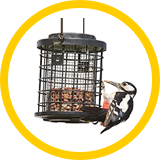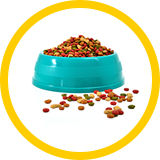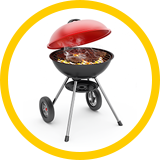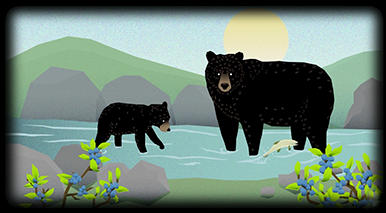Bear Wise: tips and tools
Learn how to be Bear Wise while outdoors, at your home, cottage, school, business or farm.
What you can do
Outdoors
Bears do not like surprises. To avoid bear-human encounters while outdoors in bear country:
- travel in groups of two or more—people who travel alone are most vulnerable
- scan your surroundings and do not wear headphones
- watch for signs of bear activity such as tracks, claw marks on trees, flipped-over rocks or fresh bear droppings
- leash your dog—an uncontrolled, untrained dog may lead a bear to you
- pay attention, especially if you are working, gardening or berry picking
- rise slowly if you are in a crouched position so that you don’t startle nearby bears
- avoid strong fragrances that may cause a bear to be curious, put any food you are carrying in sealed containers in your pack
- carry a whistle or air horn
- understand the use and limitations of bear spray and carry it where it’s easy to access. Bear spray is highly effective at deterring bears at close range
When out camping
Bears are attracted to anything that looks or smells like food. Items like unwashed utensils, food packaging, toiletries and trash are tasty treats for bears. To avoid bear-human encounters:
- never cook, eat or store any food (including snacks), coolers, cooking equipment or toiletries in your tent
- pack and store these items in your vehicle, out of sight, with windows closed (not in a truck bed or outside of the vehicle)
- clean food preparation areas promptly after use
- routinely take your garbage to the park’s waste depot
Backcountry camping
When backcountry camping away from a vehicle, store food properly so bears cannot access it. You should either:
- store food in a bear resistant location or container
- hang food and garbage at least four metres (13 feet) above the ground and three metres (10 feet) from tree limbs or trunks that can support a bear
- eliminate food odours from your campsite and wash dishes immediately after each meal
- burn any food scraps/fat drippings thoroughly in a hot fire
At the cottage
Most human-bear conflicts occur when bears are attracted by smells and rewarded with an easy meal. When bears pick up a scent with their keen noses, they will investigate it – even at your cottage. If bears are rewarded with feasts of bird food, garbage or pet food, they will return as long as the food source is available. It takes all cottagers working together to eliminate these attractants and to stop bear problems.
Whether you are closing the cottage for the season, or just between stays, you can take a few simple precautions to avoid problems with bears and other animals.
Here are some tips to help avoid these unwanted visitors:
- fill bird feeders only through the winter months
- keep your pets on a leash
- store garbage in a bear-resistant container with a tight-fitting lid, secure shed or garage
- do not store garbage in plywood boxes, old freezers or vehicles
- do not stockpile garbage — take it to an approved waste disposal site regularly
- if you have garbage pickup, only put garbage out on garbage day, not the night before
- keep meat scraps in the freezer until garbage day
- remove grease and food residue from barbecue grills, including the grease trap, after each use
- do not use outdoor fridges or freezers, including beverage fridges, as these may attract bears to your property
- do not put meat, fish or sweet food (including fruit) in your outdoor composter
- pick all ripe fruit off trees, and remove vegetables and fallen fruit from the ground
- never purposely feed bears (or other wildlife) or try to approach them
- encourage your neighbours to practice Bear Wise habits
Before leaving your cottage
When leaving your cottage make sure to:
- remove your garbage: take it home or drop it off at an approved waste disposal site on your way
- use a strong disinfectant to eliminate all odours from garbage and recycling containers and lids
- never discard cooking grease outside: place it in a container with a lid, transfer it to a plastic bag and include it with other properly stored garbage
- take your barbecue with you when you leave the cottage, or clean it and store it in a secure shed
- do not leave any food or food scraps outdoors for pets or other wildlife
- when packing up, remember to remove all the food from the inside of your cottage
- a box of pudding or fruit-flavoured dessert mix is all it takes to attract a bear
- do not leave scented products outside
- even non-food items like suntan lotion, insect repellent, soap and candles attract bears
- close and lock all windows and doors
- if you are away for an extended period of time, have someone you trust check in and look for signs of a bear visitor or break in
- if you rent your cottage, tell your tenants the importance of being Bear Wise
At home
Bears usually avoid humans, but they are attracted into urban and rural areas to get food.
Bears will be attracted to your neighbourhood by:
- strong food aromas
- the scent of garbage
- cooking smells
- ripe fruits and pet food left outside
If bears learn that they can find food where people live, they will often return many times as long as the food source is available. They will even try to enter buildings.
Relocating bears is not a good way to prevent conflicts because bears will remember where they found an easy meal and will return. Bears returning repeatedly to a food source can lead to a more dangerous human-bear conflict and result in the potential dispatch (killing) of the bear.
The best way to prevent conflict with bears is to avoid attracting bears to the neighbourhood by eliminating attractants.
To avoid bear encounters, follow these Bear Wise tips.

Garbage:
- put garbage out only on the morning of garbage day, not the night before
- put meat scraps in the freezer until garbage day
- put garbage in containers that have tight-fitting lids and store it in a bear-proof location such as your basement or a sturdy garage
- frequently wash garbage cans and recycle containers and lids with a strong-smelling disinfectant, such as bleach
- take garbage to the dump often, if you do not have curbside pick-up

Bird feeders:
- fill bird feeders only through the winter months
- put away feeders in the spring and instead, offer birds natural alternatives (for example, flowers, nesting boxes and fresh water)

Fruits and berries:
- pick all ripe and fallen fruit from trees and shrubs on your property
- plant non-fruit bearing trees and shrubs

Pet food:
- do not leave pet food outdoors, in screened-in areas or porches
- keep your dogs on a leash
- check the yard before you let your pets out and watch them while they’re outside
- turn on yard lights at night to scan surroundings before letting your pet out after dark

Barbecue:
- burn off food residue and wash the grill right away
- empty the grease trap every time you barbecue
- remove all utensils, dishes and food after eating
- be aware that cooking odours can attract bears
At school
If you see a bear on or around school property, go inside the school right away.
Tips for students
If you are walking home or just getting off the school bus and you see a bear, follow these tips.
If a bear sees you:
- do not approach the bear
- slowly back away toward the school or house while watching the bear
- do not turn and run
If a bear moves toward you:
- slowly back away toward the school while making noise, do not run
- remove and drop your backpack if it contains food
- yell at the bear to go away
- do not “play dead”
When you are safely away from the bear, tell the first adult you see.
Help keep bears away by:
- keeping your lunch inside the school
- not discarding food, wrappings or lunch bags in the schoolyard—take them inside the school to throw away
- telling your teacher if you see food or garbage left in open bins or in the schoolyard
- encouraging your friends to be Bear Wise
Tools for teachers
We created these tools to help teachers educate children on how to be Bear Wise in Ontario.
- Bear Wise Activity Book (PDF, Pages: 20, Size: 1.25 MB)
- Black Bear Ecology: a guide for Grade 2 teachers (PDF, Pages: 66, Size: 3.6 MB)
- Black Bear Ecology, Life Systems – Habitats and Communities: a guide for Grade 4 teachers (PDF, Pages: 66, Size: 3.4 MB)
- Black Bear Ecology: a guide for Grade 7 teachers (PDF, Pages: 52, Size: 1.7 MB)
At work
Bears love fast food and leftovers. Food service operations such as restaurants, fast food establishments and highway snack bars often have substantial amounts of garbage behind their buildings or stored nearby. Black bears are attracted to the smell of human food and garbage, and often come around foraging for an easy meal.
What business owners can do:
- avoid stockpiling garbage — including edible oils
- always use bear-resistant containers wherever possible and secure the lids
- use bear-resistant containers wherever possible and secure the lids at all times
- lock dumpster lids every night or use containers that are self-locking
- empty garbage containers frequently
- put garbage out on the morning of collection day, not the night before
- if your business takes its own garbage to the dump, make sure that it is stored securely behind closed doors or in a bear-resistant container, and take it to the dump frequently
- clean your garbage containers frequently and thoroughly
- pay particular attention to storage and disposal of edible oils and greases, and use disinfectant to eliminate odours
- share this information with your staff and advise them to be cautious when approaching bins, particularly at night
- consider installing motion-activated lights
- encourage customers to use garbage containers, and to not leave scraps or garbage on the ground
On the farm
Black bears often approach farm properties to find food, especially when their natural food sources are scarce. There are several things you can do to keep bears away from your farm so that the use of firearms becomes a last resort.
Tips for farmers:
- plant grain or cornfields as far away from the edge of the forest as possible. Leave a swath of open land or pasture between crops and the forest edge
- pick all ripe fruit off trees and remove vegetables and fallen fruit from the ground
- use electric fencing around orchards, beehives and vegetable and berry patches, or between grain crops and adjacent forest areas. Electric fencing can also help protect your animals and livestock. Install electric fences before bears become a problem or as soon as possible if bears are a problem. Electric fencing works best to deter bears if they have not become food-conditioned
- keep your livestock away from woodlots and bear travel routes
- ensure that calving areas are in an open space away from forest cover
- dispose of dead stock according to legal requirements, and in a manner that bears cannot access them, since bears will eat carcasses
- be alert for bears when working in bear habitat
- develop a network with your neighbours to help keep each other informed about bears in your area
You do not need a hunting licence to kill a bear in self-defence, however:
- If you kill a bear and do not intend to keep it, report it immediately to your local ministry office.
- If you kill a bear and want to keep it, you must register for a Notice of Possession with the ministry.
Be Bear Wise and prevent bear encounters
Prevent and report encounters with black bears and learn who to contact.
